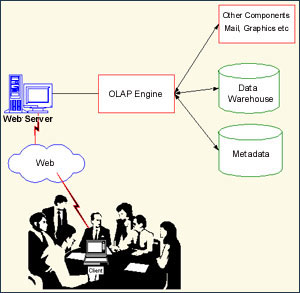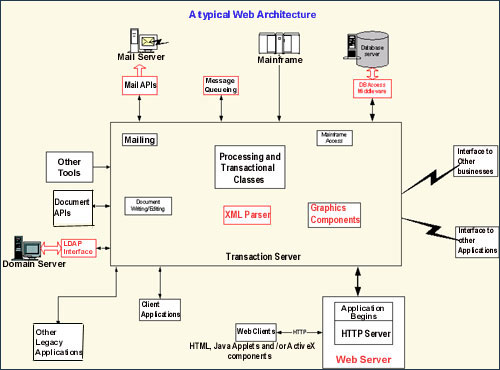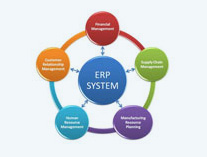Web Engineered Technology Consulting & Solutions
The Internet has evolved from a scientific network to a platform that enables a new generation of businesses.Vinculum professionals institute the long-term technological vision into perceptual units, to bridle the passion of rebirth, rejuvenation and resurrection into the realms of Internet presence.
Vinculum E-Commerce strategy involves:
- Opening up the enterprise to include partners suppliers and customers.
- Connecting the new, expanded enterprise through a universal electronic medium.
- Integrating and aligning technology, processes, and human performance
- Defining and implementing a distinctive Internet presence
- Re-evaluating the organization's entire business model
The Domain
- Business-to-Consumer
- Business-to-Business
- Intranet Applications
- Knowledge Management
- Web Based Data Warehousing
- Web Interface to ERP
- Industries
The Technology
- Architecture
Windows DNA - Java Based Architecture
- E-Commerce Application building tools
- Design and Development Tools
- Web Servers and Application Servers
- Database Servers
The Domain
The areas where Vinculum E-commerce strategy can be applied:Business-to-Consumer
Direct Marketing, Selling, and Service ApplicationsSecure, Targeted, Automated Up-selling and Cross-selling, Personalized, Scaleable Applications.
Financial and Information Services
For companies who want to distribute important, valuable and or confidential information over the Internet for applications such as Online Banking, Online Billing or Online Trading
Applications that implement Personalization, Membership, Advertisement Management, Inventory Management, Distribution Management, Routing, Certificate Management and whole host of other systems adding value to Business-to-Consumer interaction.
Business-to-Business
Winning in the electronic economy often requires multi-company collaboration within and across industry boundaries. It requires more advanced-technology capabilities; advanced internet, intranet and extranet, for moving into cross-industry nets. It requires businesses with the traditional mindset of a single company in a single industry to leap into a new life cycle curve: multi-company collaboration within an industry.Typical applications that make Business-to-Business communication happen include:
Corporate Purchasing
Secure, scaleable, customizable web applications that automate the purchasing process in a company, interlacing them with vendor applications.
Value Chain
Value Chain applications provide tight integration between the company, manufacturers and distributors. These applications make inter-business processes efficient by deploying open standards for electronic document exchange and expanding the selection of suppliers.
Customer Relationship Management
Customer Relationship Management (CRM) builds linkages between marketing, sales and service, the front and back office, in order attract, retain, and build better relationships with customers. CRM helps companies achieve growth by focusing on each of the links in the customer relationship value chain. CRM implementations involve optimizing clients’ marketing, sales and service effectiveness; enhancing its call center operations; incorporating the impact of electronic commerce into its business strategy; and proactively driving action from customer insights.Intranet Applications
Industry experts define the current era as Content Era, placing emphasis on:
Creation and Management of Content
Application Software Logic
Collaboration and Information Exchange among users
Currently traditional client/server applications are undergoing a metamorphosis, often emerging as intranet applications.
There are several reasons for companies to adopt the web as a part of their internal information strategy:
Access to information -Companies are finding the Web an easy way to distribute information
Seamless integration of information - Integration of static information (such as policies, history etc.), dynamic information (such as stock quotes, weather, traffic, etc.), and applications (such as workflow, data warehouse, management, ERP Systems etc.)
Creation of value -Technology’s greatest value is achieved from complete integration of all business processes, and building applications on the web is the best alternative.
Platform independence -Because there are browsers on every major platform, developers no longer need to worry about cross-platform client development
Implementation -Implementation costs are very low, because of the elimination of client software
Maintenance - Less maintenance overheads, since there is no client software
Multiple data types - Developers can easily provide access to multimedia as well as text information
Connects people to distributed information - Information from any part of the company is available to every one across the company. More information is available to more people at less cost
Controlled distribution of information -Information access is controllable by implementing security
Support collaboration - Intranets help people to work with each other, removing geographic and technological barriers
Knowledge Management
Knowledge Management is founded on :- Capturing diverse knowledge from sources such as databases websites, employees and partners.
- Building relationship with different sources of information within the corporation
- Partnering technology with a corporate culture and business processes
- Managing company experimental and intellectual capabilities
- Capturing data from experience, peer expertise and analysis of business data.
- Deals with cultural, strategic, process, and technological issues of a company.
- Are company specific
- Are built around processes, organizational dynamics and technology.
- Corporate or departmental intranets,
- Corporate Yellow Pages
- Support design and development of products and services
- Customer, issue or support management applications
- Applications that help business planning
- Applications for tracking and workflow
- Applications that help analyze data such as experimental data, test data, survey data etc.
- Applications for human resource development
Web-based Data Warehousing

A Data Warehouse is a combination of technologies that enable users to dynamically generate a database query, conduct data analysis and format results as text or graphs. The data warehousing application can be built using the Web application framework, so that it uses Web Server and application servers for generating and processing database queries and web browser for displaying results.
A data warehouse is a repository of the structured data. Online Analytic Processing (OLAP) provides tools needed to access and analyze this data. Intranet technologies can be leveraged to use OLAP and Data Warehouse to extend data to the entire corporation.
Web Interface to ERP
ERP helps transform all business functions, reduce and cycle times and translate these benefits into increased profits. ERP is structured in such a way that the departments function in tandem, and not in isolation as they usually do.Technologies that enable web development
How Ecommerce is enabled in various enterprise:
Web Application Architecture
Various Web technology pioneers have proposed different tools and methodologies to achieve the above shown architecture. Following are few of the models widely practiced in the industry.1.Microsoft’s Windows Distributed Internet Application Architecture
2 Java Based Architecture

Windows DNA
Microsoft Windows Distributed Internet Applications Architecture (Windows DNA) is the application development model for the Windows platform. Following are the main components of Windows DNA- Windows NT Server and Microsoft BackOffice
- Component Object Model: Business Logic implemented using COM/DCOM components
- Presentation Services: HTML, DHTML, Scripting and ActiveX and Java Components
- Application Services: Internet Information Server, Microsoft Message Queue Server, Microsoft Transaction Server, and Site Server
- Data Access Services: Universal Data Access, ADO, OLE DB, and CDO
- Windows System Services: Directory Services (ADSI), Security, Management, Networking and Communications.
- Windows DNA Tools: Microsoft Visual Studio
Java Based Architecture
- Clients based on a thin client, Web browser/Java applet model
- A network infrastructure that provides services such as TCP/IP
- Directory: LDAP, built using Java’s JNDI APIs Security: CDSA, SSL, IPsec, x.509v3 certificates built using Java’s JSSL and JCE APIs
- Application server software that provides a platform for e-business applications and includes an HTTP server, database and transaction services, mail and groupware services, and messaging services.
- Application integration that provides access to existing data and applications
- A web application programming environment that provides the server-side servlet and Enterprise Java programming environment for creating dynamic and robust e-business applications. The programming environment includes servlets, XML on the web server, HTML, Scripts and Applets on the web client and CORBA as the component model
- E business application services that provide higher level application specific functionality to facilitate the creation of e-business solutions
- Systems management functions that accommodate the unique management requirements of network computing across all elements of the system, including users, applications, services, infrastructure, and hardware
- Development tools to create, assemble, deploy, and manage applications
Vertical Segments
We believe that a consultant can be successful only if they have the domain knowledge in a client’s industry. We have successfully executed web projects in the following industries:
- Automotive and Industrial Equipment
- Communications
- Energy
- Banking
- Health Services
- Insurance
- Government
- Retail
Web Applications Building Tools
Microsoft Site Server
Vinculum’ consultants have expertise in development, deployment and management of Microsoft Site Server and Commerce Edition Suite of products.
Site Server
Microsoft Site Server is the intranet server that works on the Windows NT Server and Internet Information Server (IIS) environment. The Site Server helps organizations streamline the intranet development process. This product can integrate information stored in different sources, such as SQL Server, Oracle or any other databases, Microsoft Exchange, web sites, file servers etc. It also contains applications for Content Management, Content Deployment, Search, Personalization, Analysis, etc.
Commerce Edition
Site Server Commerce Edition is a product suite of product that helps businesses deploy and manage business-to-consumer, corporate purchasing, and supply chain management applications. Vinculum has experience in developing e-commerce solutions using this tool, and has used secure payment mechanisms, membership server, personalization server, advertising management server, among others.
iPlanet CommerceXpert
Vinculum has also completed successful E-Commerce projects using the Sun-Netscape alliance’s iPlanet products. Briefly, these products contain:
iPlanet CommerceXpert; a suite of web applications for buying, selling, merchandising and delivering content over the Internet.
Tools in the suite include:
Netscape EXpert
Seamlessly connects internal business systems with partners, suppliers and customers. These tools leverage existing investments in ERP, EDI and other transaction processing systems.
Netscape BuyerXpert
Enables corporate procurement over the Internet and helps employees’ purchase for the company.
Netscape SellerXpert and MerchantXPert
These are Business-to-business selling and business-to-consumer selling tools.
Netscape PublishingXPert
Manages information sales, targets advertising, and dynamically generates personalized information.
(Advertisement logos of these products in this page)
Design and Development Tools
Microsoft Visual StudioVinculum is experienced in building Web applications using Visual C++, Visual Interdev, Visual Basic and other products in Microsoft’s Visual Studio suite. We have the expertise in building COM and DCOM components using Visual C++ and Visual Basic and ASP using Visual Interdev.
Java
We are experienced in building web applications using Java, be it E-Commerce, Internet or intranet applications. Java as a server side technology is used in building CORBA components, servlets, WAI components, LDAP directory service components, XML parsers and others. Java is used to build applets and Java Beans components on the client side to bring interactivity to the web site.
Case Tools
Our web projects are designed using Object Oriented Analysis and Design Case Tools such as Rational Rose. Our consultants are well versed in Object Oriented Analysis and Design methodologies such as Object Modeling Technique and Booch Methodology using industry standard Unified Modeling Language.
Web Servers and Application Servers
We are skilled in building applications on Microsoft Internet Information Server, Microsoft Transaction Server, and Microsoft Message Queue Server as well as on Netscape Enterprise Server, Netscape Application Server, IBM MQ series, Apache and other web servers.Database Servers
The database servers are the chief source of information. The transactional and analytical data of the applications are stored in the database servers. We have expertise in Oracle, Microsoft SQL Server, Sybase, Informix, and DB2 database servers.Database Services
One of your organization’s most significant assets is accumulated volume of information we call data. At Vinculum, we are experts in handling data -- from modeling your data requirements to assisting in the design and creation of your database or mining your data for business information. In this increasingly competitive business world, transforming your data into useful information can unlock countless business opportunities.
Vinculum consultants have extensive experience with relational DBMSs such as Oracle, DB2 and Microsoft SQL Server. We will create robust, high business value databases to fit the unique business requirements of your organization and fine tune those databases to give you the level of performance required for today’s mission critical systems. Be assured that Vinculum has the experience and bandwidth necessary to manage your database needs such as:
- Data architecture design and implementation
- Data warehousing
- Data modeling
- Data migration/conversions
- Administration and support of existing databases
- Logical and physical database design
- Database installation
- Database performance tuning
- Data integration
















